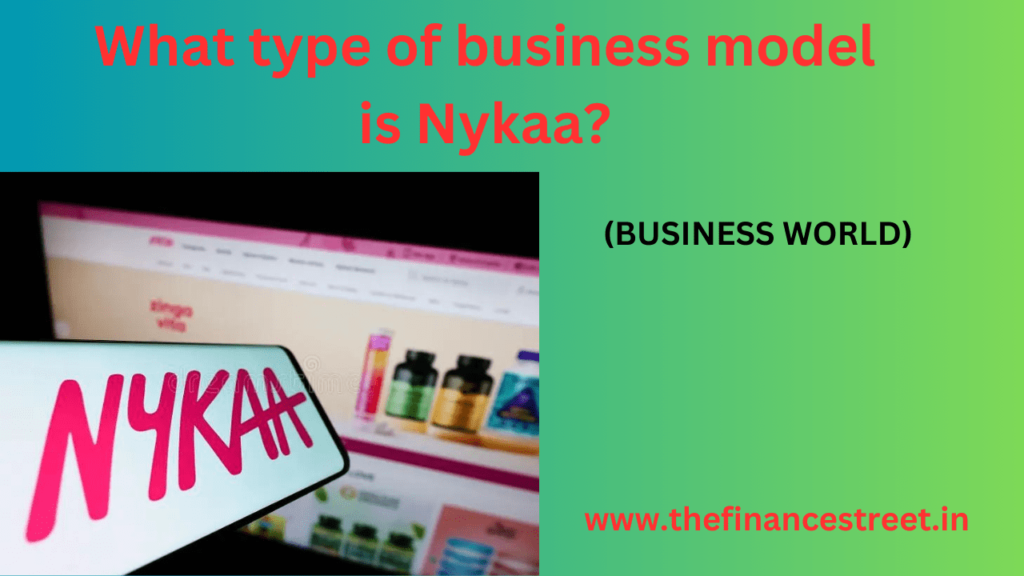Introduction –
The type of business model is Nykaa beauty brands operates primarily “E-commerce Marketplace, Private Label” business model in beauty,fashion. Nykaa, a leading name in the Indian beauty and wellness industry, has carved a remarkable niche for itself through its innovative and customer-centric business model. Founded in 2012 by Falguni Nayar, Nykaa has become synonymous with beauty and personal care products, offering an extensive range of cosmetics, skincare, haircare, fragrances, and wellness items to a diverse and growing customer base.
At the core of Nykaa’s business model is its e-commerce marketplace, which serves as a digital haven for beauty enthusiasts. The company’s unique blend of traditional and modern retail strategies, including the introduction of its private label, strategic brand partnerships, and the creation of a seamless omnichannel experience, has catapulted Nykaa to the forefront of the Indian beauty retail landscape.
In this exploration of Nykaa’s business model, we delve into the key components, strategies, strengths, and challenges that have contributed to its remarkable journey of success in the ever-evolving world of beauty and wellness retail. From its inception to its ongoing endeavors, Nykaa’s story is a testament to the transformative power of innovation, technology, and unwavering commitment to customer satisfaction in the competitive realm of e-commerce and beauty.
What type of Business Model is Nykaa?
Nykaa operates primarily under the “E-commerce Marketplace and Private Label” business model in the beauty and wellness industry. This model combines elements of an online marketplace and proprietary product offerings. Here’s a detailed breakdown with keywords for Google search:
- E-commerce Marketplace: Nykaa functions as an e-commerce platform that connects buyers with a vast selection of beauty and wellness products from various brands and sellers.
- Online Beauty Retailer: Nykaa is a prominent online retailer specializing in beauty and wellness products, offering a wide range of cosmetics, skincare, haircare, and more.
- Hybrid Retailer: Nykaa’s hybrid approach involves both operating as a marketplace for third-party brands and selling its own private label products.
- Private Label Beauty Products: Nykaa develops and sells its exclusive line of beauty and skincare products, which distinguishes it from traditional e-commerce marketplaces.
- Commission-Based Model: Nykaa earns revenue by facilitating transactions between customers and third-party sellers on its platform, charging a commission or fees for each sale.
- Customer-Centric Approach: Nykaa places a strong emphasis on enhancing the customer shopping experience, offering product reviews, tutorials, and personalized recommendations.
- Brand Partnerships: The platform collaborates with numerous well-known beauty brands, making their products accessible to a wide customer base.
- Beauty E-tailer: Nykaa leverages the power of the internet to provide customers with easy access to a diverse range of beauty and wellness products.
- Digital Beauty Marketplace: Nykaa’s business model is heavily reliant on its online presence, offering a one-stop shop for beauty enthusiasts across India.
- Indian Beauty Retailer: Nykaa is an indigenous brand that caters to the unique beauty needs and preferences of the Indian market.
In summary, Nykaa’s business model encompasses e-commerce, private label development, and brand partnerships, making it a prominent player in the online beauty and wellness retail space.
What is the success Journey of Nykaa Brands?
Nykaa, founded by Falguni Nayar in 2012, has embarked on a remarkable success journey in the beauty and wellness industry. Here’s an overview of its key milestones:
- Inception and Vision: Nykaa was founded with a vision to provide a one-stop destination for beauty and wellness products in India, addressing the growing demand for online shopping in this sector.
- Launch and Marketplace Model: Nykaa started as an e-commerce marketplace, offering a wide range of products from various beauty and wellness brands, effectively tapping into the online shopping trend.
- Customer-Centric Approach: The company adopted a customer-centric approach, focusing on enhancing the online shopping experience through features like detailed product information, user reviews, and personalized recommendations.
- Private Label Launch: Nykaa introduced its private label in 2015, offering a range of high-quality beauty and skincare products under the “Nykaa” brand. This move allowed them to differentiate themselves and boost profitability.
- Expansion and Offline Stores: Nykaa expanded its presence by opening brick-and-mortar retail stores across India, creating an omnichannel experience for customers.
- Diversification: The brand diversified its product offerings beyond cosmetics, including skincare, haircare, fragrances, and wellness products, catering to a broader audience.
- Digital Marketing and Influencer Collaborations: Nykaa leveraged digital marketing strategies and collaborated with popular influencers and beauty experts to promote its products and engage with its target audience effectively.
- Investment and Funding: The company secured substantial investments from venture capitalists and private equity firms, which allowed it to scale operations and expand its product range further.
- Brand Recognition: Nykaa gained recognition as a trusted and reliable brand in the Indian beauty industry, known for offering genuine products and expert advice.
- IPO and Further Growth: In 2020, Nykaa announced plans for an initial public offering (IPO), marking a significant milestone in its journey. This IPO aimed to raise funds for further expansion and growth.
- Market Dominance: Nykaa emerged as a dominant player in the Indian beauty and wellness e-commerce sector, competing with international giants and establishing a strong foothold.
- Innovation and Technology: The company continued to innovate, incorporating advanced technology such as augmented reality (AR) for virtual try-ons and AI-driven product recommendations.
- Sustainability Initiatives: Nykaa also embraced sustainability by introducing eco-friendly packaging and promoting ethical practices in the beauty industry.
Nykaa’s journey is characterized by its commitment to providing an exceptional shopping experience, diversifying its product offerings, embracing technology, and building a trusted brand. Its success story reflects the rapid growth of e-commerce and the beauty industry in India, making it a notable example of entrepreneurial success in the country.
What are the Business strategies of Nykaa?
Nykaa has employed several key business strategies to achieve its success in the beauty and wellness industry. Here are some of the prominent business strategies of Nykaa:
- E-commerce and Marketplace Model: Nykaa’s core strategy revolves around its e-commerce platform, which operates as a marketplace for beauty and wellness products. This model allows it to offer a vast selection of products from various brands, meeting diverse customer preferences.
- Private Label Development: Nykaa’s private label strategy involves creating its own line of beauty and skincare products. This not only differentiates Nykaa from competitors but also offers higher profit margins as they have control over pricing and quality.
- Customer-Centric Approach: Nykaa places a strong emphasis on enhancing the customer shopping experience. Detailed product information, user reviews, expert advice, and personalized recommendations contribute to building customer trust and loyalty.
- Omnichannel Presence: Nykaa expanded beyond its online platform by establishing physical retail stores. This omnichannel approach allows customers to engage with the brand both online and offline, creating a seamless shopping experience.
- Diversification of Product Range: The company diversified its product offerings beyond cosmetics to include skincare, haircare, fragrances, and wellness products. This strategy caters to a broader audience and increases average order value.
- Digital Marketing and Influencer Collaborations: Nykaa leverages digital marketing strategies and collaborates with beauty influencers and experts to promote its products and engage with its target audience effectively.
- Investment and Funding: Nykaa secured significant investments from venture capitalists and private equity firms, enabling it to scale operations, expand its product range, and invest in technology and infrastructure.
- Brand Building and Trustworthiness: Nykaa has built a reputation for being a trustworthy and reliable brand in the Indian beauty industry. They offer genuine products and promote transparency in their operations.
- Innovation and Technology: Nykaa embraces technology by incorporating features like augmented reality (AR) for virtual try-ons and AI-driven product recommendations. These innovations enhance the online shopping experience.
- Sustainability Initiatives: Nykaa has taken steps to promote sustainability by introducing eco-friendly packaging and promoting ethical practices in the beauty industry. This aligns with growing consumer preferences for sustainable brands.
- Exclusive Brand Partnerships: The company collaborates with popular and exclusive beauty brands, giving customers access to a wide range of high-quality products.
- Data Analytics: Nykaa utilizes data analytics to gain insights into customer behavior, preferences, and trends. This data-driven approach helps in making informed decisions about product offerings and marketing strategies.
- Global Expansion: Nykaa expanded its reach internationally, making its products accessible to customers beyond India, tapping into the global market.
These business strategies collectively contribute to Nykaa’s growth and its position as a leading player in the Indian beauty and wellness industry. Their ability to adapt to changing consumer trends and preferences, innovate with technology, and build a trusted brand has been instrumental in their success.
Who is the main competitors of the Nykaa Brands in Market?
Nykaa faces competition from several prominent players in the Indian beauty and wellness market. Some of its main competitors include:
- Amazon India Beauty: Amazon’s dedicated beauty section offers a wide range of beauty and wellness products, including cosmetics, skincare, and haircare items. It leverages its strong e-commerce presence and customer base to compete with Nykaa.
- Flipkart: Flipkart, another major e-commerce platform in India, has a significant presence in the beauty and personal care segment. It competes with Nykaa by offering a diverse range of beauty products.
- Sephora India: Sephora, an international beauty retailer, has expanded its presence in India and competes with Nykaa in offering premium and international beauty brands. Sephora provides a unique in-store shopping experience.
- Purplle: Purplle is an Indian beauty and personal care e-commerce platform that competes with Nykaa. It focuses on offering a wide range of beauty products and often provides competitive pricing.
- Myntra: Myntra, owned by Flipkart, also competes in the beauty and personal care segment. It offers a selection of beauty products and has a strong fashion and lifestyle customer base.
- L’Oréal India: L’Oréal, a global beauty and cosmetics company, competes with Nykaa through its own brand offerings and distribution network in India.
- Nykaa Fashion: Nykaa’s sister concern, Nykaa Fashion, competes in the fashion and apparel segment. While it’s a part of the same Nykaa Group, it competes with other fashion e-commerce platforms.
- Local Beauty Stores: Nykaa also faces competition from local beauty stores and salons, especially in smaller towns and cities, where offline retail remains significant.
- Health and Wellness Brands: Brands specializing in health and wellness products, including natural and organic options, are competitors in this evolving segment.
- Specialty Beauty Retailers: Specialized beauty stores and retailers that offer unique and niche beauty products pose competition in their respective niches.
Nykaa has managed to maintain a strong position in the market through its business strategies, private label offerings, and customer-centric approach. However, competition in the Indian beauty and wellness market remains dynamic, with various players vying for market share.
Critical Analysis of Nykaa Business model –
A critical analysis of Nykaa’s business model reveals both strengths and potential challenges:
Strengths:
- Market Leader: Nykaa has established itself as a market leader in the Indian beauty and wellness e-commerce sector. Its wide product range, strong brand reputation, and customer-focused approach have contributed to its success.
- Diversification: Nykaa has diversified its product offerings beyond cosmetics to include skincare, haircare, fragrances, and wellness products. This diversification caters to a broad customer base and increases revenue streams.
- Private Label Success: The development of its private label products has been a significant success. It allows Nykaa to differentiate itself, control pricing, and improve profitability.
- Omnichannel Presence: Nykaa’s offline retail stores provide a unique omnichannel experience, allowing customers to engage with the brand both online and offline.
- Customer-Centric Approach: Nykaa places a strong emphasis on customer satisfaction, offering product reviews, expert advice, and personalized recommendations. This approach builds trust and loyalty among its customer base.
- Innovative Technology: The integration of technology, including augmented reality (AR) for virtual try-ons and AI-driven recommendations, enhances the online shopping experience and sets Nykaa apart as a tech-savvy retailer.
- Brand Recognition: Nykaa is recognized as a trusted brand in the Indian beauty industry, known for offering genuine products and high-quality customer service.
- Sustainability Initiatives: Nykaa’s focus on sustainability, such as introducing eco-friendly packaging, aligns with growing consumer preferences for environmentally conscious brands.
Challenges:
- Intense Competition: The beauty and wellness market in India is highly competitive, with other e-commerce giants like Amazon and Flipkart, as well as specialized players like Purplle and Sephora, vying for market share.
- Profit Margins: While Nykaa’s private label products offer higher profit margins, they also face competition from established brands. Balancing pricing and quality to remain competitive can be challenging.
- Logistics and Delivery: Ensuring timely and efficient delivery of products, especially in a vast and diverse country like India, can be a logistical challenge.
- Regulatory Compliance: The beauty and wellness industry is subject to various regulations, including product safety and labeling requirements. Nykaa must ensure compliance to maintain trust with customers.
- Global Expansion: While Nykaa has expanded internationally, scaling operations in new markets presents its own set of challenges, including adapting to different consumer preferences and regulatory environments.
- Cybersecurity: As an e-commerce platform, Nykaa faces cybersecurity threats, including data breaches and payment fraud, which can damage its reputation and customer trust.
- Supply Chain Disruptions: Events such as the COVID-19 pandemic highlighted the vulnerability of supply chains. Ensuring a robust and resilient supply chain is essential for Nykaa’s operations.
In conclusion, Nykaa’s business model has been highly successful in the Indian beauty and wellness industry due to its customer-centric approach, product diversification, and technological innovations. However, it must navigate challenges such as intense competition, profit margin management, and regulatory compliance to sustain and expand its market leadership. Continuous adaptation and innovation will be crucial for Nykaa’s long-term success.
Conclusion –
In conclusion, Nykaa’s business model has been a resounding success story in the Indian beauty and wellness industry. It has demonstrated several key strengths that have propelled its growth and market leadership. These strengths include diversification of product offerings, the successful implementation of a private label strategy, a customer-centric approach, innovative use of technology, and a strong brand reputation.
However, Nykaa also faces notable challenges, including intense competition, the need to balance profit margins with competitive pricing, logistics and regulatory complexities, and cybersecurity concerns.
Despite these challenges, Nykaa has managed to maintain its position as a market leader, thanks to its adaptability and commitment to enhancing the customer experience. As it continues to evolve and expand, Nykaa will need to remain agile, innovative, and responsive to changing market dynamics and consumer preferences.
In the dynamic and competitive landscape of the beauty and wellness industry, Nykaa’s journey serves as an inspirational example of how a well-executed business model, coupled with a dedication to customer satisfaction and innovation, can lead to remarkable success. Nykaa’s continued growth and ability to navigate challenges will be closely watched in the years to come.



